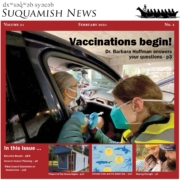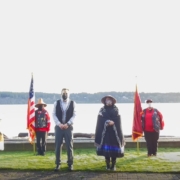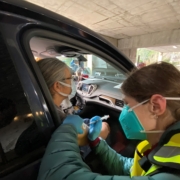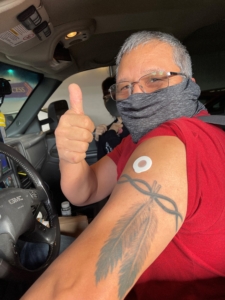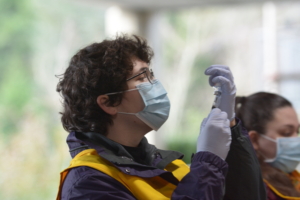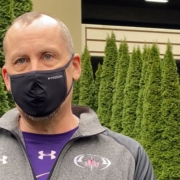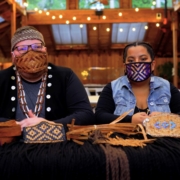Suquamish Tribe Sends Greetings to President Biden
The Suquamish Tribe sends greetings to President Joe Biden and Vice President Kamala Harris on the day of their historic inauguration. We stand united in our prayers and our well wishes for you and for our country.
Suquamish Tribe Prepares to Vaccinate General Membership
COVID-19 Vaccinations continue for Tribal Elders
The Suquamish Tribe Government was notified its second 600-dose shipment of Moderna COVID-19 vaccine is on the way and should arrive next week.
That shipment will come just as the Tribe is wrapping up distribution of the first 600-dose lot of vaccines that it began administering to Tribal Elders on Jan. 4. A small group of medical and support staff needed to distribute the vaccine began getting their vaccines on Dec. 30.
The new shipment sets the stage to begin vaccinating the Tribe’s general membership next week. “We should be able to begin vaccinating general Tribal membership households starting on Jan. 14” May said. “That timeline hinges on our next round of doses arriving as we’ve been promised,” she added.
Meanwhile, most Elders – all Tribal members 55 years old and above, as well as their spouses/partners – who want the vaccine are expected to be vaccinated by the end of this week. Additional front-line Tribal staff and first responders are also receiving the vaccine.
“Our next focus will be on vaccinating the Tribal staff needed to provide essential services and support to our Tribal people,” said May.
That will include members of the Tribe’s Human Services Department, which is responsible for Elder care, veterans services, assistance programs, and health benefits, among others. Staff at the Marion Forsman-Boushie Early Learning Center and Chief Kitsap Academy will also be among the next round of vaccinations, as well as Suquamish Seafoods operations.
“We’ve got to get the teachers and childcare providers inoculated so that our people with kids can work,” said May. “The immediate priority now, over the next few days, is on getting vaccinations to those who provide essential services to Tribal members and keep the government running.”
After Tribal households are vaccinated, remaining government staff will receive their shots.
Suquamish Tribe interim Co-executive Director Scott Crowell noted the Tribe has been able to get vaccinations moving to its members with record speed, with more doses now being ordered weekly.
Indeed, for the rest of Washington State, the vast majority of vaccination efforts are still focused on getting health care providers inoculated while health districts grapple with the logistics and training needed for rolling mass vaccinations.
“We were able to get our first 600 doses pretty quickly. If we are able to get more doses at that rate, I think we should be able to have everyone vaccinated – hopefully – by the end of January,” said Crowell.
Suquamish Tribe Chairman Leonard Forsman said the speed with which the Tribe has been able to begin delivering vaccines is directly connected to weeks of hard work by Tribal staff.
“I’d like to emphasize all the planning that’s made this process so smooth,” said Forsman. “My hands are up to the people in the Human Services Department and Emergency Operation Center. I’m really impressed with all the hard work they had to do, even during the Christmas holiday, to get this set up. The EOC, headed up by Cherrie May, and Human Services led by Nehreen Ayub, and also the important work of our Community Health nurse, Dr. Barbara Hoffman, have all done a great job coordinating staff to make this vaccination a great success so far.”
Tribe welcomes New Year with COVID-19 Vaccinations
As the sun sets on 2020, the Suquamish Tribe begins COVID-19 vaccinations.
A small group of healthcare providers and support staff received their first doses this week. That sets the stage for mass vaccinations, starting with Tribal Elders, beginning on Monday, Jan. 4.
In this New Year’s Eve video, Interim Suquamish Tribe Co-Directors Scott Crowell and Jamie Gooby provide details on how vaccinations for the Tribe will unfold in the coming days and weeks as the Tribe looks forward to 2021.
Suquamish Tribe Holiday Hours
Tribal Government offices are now closed for the holidays
Offices are scheduled to reopen on Monday, Jan. 4, 2021 at 8am
Police Patrol Operations will remain active
Suquamish Police Department lobby will be closed to the public
from Dec. 24 – Jan. 3 and will not be accepting deliveries.
Emergency Contact: 9-1-1
The following offices remain on Emergency Standby through the closure:
Community Health Nursing Team
Will continue following any Tribal members or staff members in isolation or quarantine.
We will not be conducting Covid-19 testing. Click here for a list of confirmed sites that will be testing. Medical transportation will not be available.
Elders can call: Della Crowell at (360) 394-8417
Emergency Management
On standby to assist in any emergency incidents. Please contact:
Cherie May at (360) 394-8507 cmay@suuamish.nsn.us
Eric Quitslund at equislund@suquamish.nsn.us.
ʔiišədalʔtxʷ ʔə ti suq̓ʷabš (Family and Friends Center)
Emergency contact: Barb Santos, 360) 340-2338 or bsantos@suquamish.nsn.us
Health Benefits
Emergency Contact: 360-394-8424
Human Services
Emergency Contact: (206) 920- 0748
Tribal Child Welfare
On-call rotation on standby throughout the closure for emergencies.
Emergency Contact (360) 394-8480
Note: This line is covered at all times. If no answer, please leave a voicemail and someone will return your call as soon as possible.
Suquamish Seafood Retail Store:
Dec. 23 – OPEN 9am- 5pm
Dec. 24 – OPEN 9am-2pm
Dec. 25- 27 – Closed
Dec. 31-Jan. 3 – OPEN 9am-5pm
Send comments, questions, or concerns to: Covid_Quesitons@suquamish.nsn.us
Suquamish Tribe 2020 COVID-19 Testing Site: Holiday Closure Schedule
The Tribal Government offices, and therefore the Tribal Covid-19 testing site, will be closed Dec. 18 – Jan. 3, 2020.
We will resume testing on:
Monday, Jan. 4, 2021 from 8:30 am to 12:00 pm
The following list includes other testing sites that can be used. We have called and verified the information, however, we recommend you call first. Be sure you take your insurance cards.
Immediate Clinic Poulsbo
(360) 779-7011
COVID-19 testing center
Appointment required- schedule appointment online
Referral not required
Testing for all patients
Hours: 8am-8pm
Franciscan Medical Clinic- Bainbridge Island
COVID-19 testing center
Appointment required- call (206) 201-0488 to schedule
Referral not required
Testing for all patients
Hours:
M-F: 7am-6:30pm, Sa-Sun: 8am-4:30pm
Closed on Thanksgiving, Christmas Day, and New Year’s Day.
Open until noon Christmas Eve
Open until 5pm New Year’s Eve
The Doctors Clinic Ridgetop East
(360) 782-3400
COVID-19 testing center
Appointment not required
Referral not required
Testing people with COVID symptoms or recent/probable exposure
Hours:
M-F: 9am-7pm, Sa-Sun: 9am-5pm
Closed Christmas
Harrison Belfair Urgent Care
(360) 277-2975
COVID-19 testing center
Appointment not required
Referral not required
Testing for all patients
Hours:
M-F: 7:30am-7:30pm, Sa-Sun 7:30am-7:30pm
Christmas: 9am-4pm
Kitsap County Community COVID testing sites:
Appointment required for Kitsap County community COVID testing. Register online here or by phone at (360) 728-2235.
Kitsap County Fairgrounds
1336 NW Fairgrounds Rd
Bremerton, WA
Center the grands by Gordon Field
Monday to Thursday 10am -3pm
360-728-2235
Kitsap Conference Center
Bremerton Harborside Parking Garage level 2 green
100 Washington Ave
Bremerton
Tuesday only 10am to 3pm
360-758-2235
Poulsbo City Hall
200 Moe Street NE
Poulsbo
Friday only 9am to 2:30
360-728-2235
Suquamish Government Picks Moderna Vaccine for Distribution to Tribal Community
Tribe Now Entering Critical Period to Prevent Spread of Disease
The Suquamish Tribal Council, following the recommendation of the Tribe’s Public Health Officer, Dr. Barbara Hoffman, has decided to provide the Moderna COVID-19 vaccine to Tribal membership and staff as it becomes available.
The Moderna vaccine is expected to gain approval for emergency use from the Food and Drug Administration this week. While it remains unclear how quickly mass vaccinations will begin, Tribal officials expect the first small batches of doses to begin arriving shortly after the New Year with additional supplies increasing over the following weeks.
Tribal officials have prioritized vaccinations to Elders and those most at-risk from COVID-19, as well as continuity of government to ensure leaders and critical staff are able to keep distribution moving.
“We’re starting to see the light at the end of the tunnel, but that tunnel is still pretty long,” says EOC Manager Cherrie May. “It will still be several months before we can get everyone vaccinated.”
That’s why it is so important for everyone to continue staying focused on preventing the spread of the virus.
“Wear your masks, keep your distances, and please – please – don’t gather outside your immediate households. I know that will be hard during the holidays, but it is so important. We really can pull together right now, by staying apart.”
Kitsap County and the Suquamish Tribe, like much of the country, is seeing a surge in positive cases. The spike is largely attributed to extended families and friends gathering together for Thanksgiving.
“Let’s not make that same mistake here over Christmas and New Year’s,” says May. “The risk is too big. The consequences are too severe. The lives of our loved ones are at stake.”
Picking Moderna
Meanwhile, Tribal staff are hard at work preparing for vaccine distribution.
The Tribal Council had the choice of two vaccines — one offered by Pifzer and the other by Moderna.
“In close consultation with our medical experts, we determined the Moderna vaccine provided the best option for our community,” says Hoffman.
The vaccines are more similar than they are different, with the exception of how they are stored
The Moderna vaccine is about 95 percent effective. It requires two doses, about a month apart, to achieve that high level of effectiveness. This is a new type of vaccine that helps people create virus-fighting antibodies without actually infecting them with COVID-19.
And, finally, some people will feel the same short-term, flu-like side effects from either vaccine. Health experts at FDA and CDC stress that most side effects are a sign that the vaccine is working as intended.
Unlike the Pfizer vaccine, which has more demanding frozen storage and distribution protocols, Moderna’s vaccine can be stored four degrees below zero, which is a standard freezer temperature. After it’s thawed, it can be administered for up to 30 days.
“The logistics of providing the vaccine to the entire Tribal community will be unprecedented for us,” says May. “A lot of work is going into planning and preparing for that, so getting the increased flexibility that Moderna gives us is huge.”
Side effects are a good sign
They may not feel like it at the time, but most side effects from the vaccine are a good thing, say health experts.
“They show the body is doing exactly what it’s supposed to be doing,” says Suquamish Tribe’s Public Health Officer Dr. Barbara Hoffman. “It shows that your immune system is working by creating the antibodies you need to fight off the disease.”
Potential side effects include pain or swelling at the injection site, muscle and joint aches, fever, nausea, and headache.
“The most common side effects noted in vaccine trials were pain and swelling at the injection site,” says Hoffman. “For most study participants, side effects were mild to moderate and subsided within one to three days.
But don’t worry if you don’t feel those side effects, she says. “It’s still working. The vast majority of those who get both doses – and it’s really important everyone gets both doses – will be protected.”

